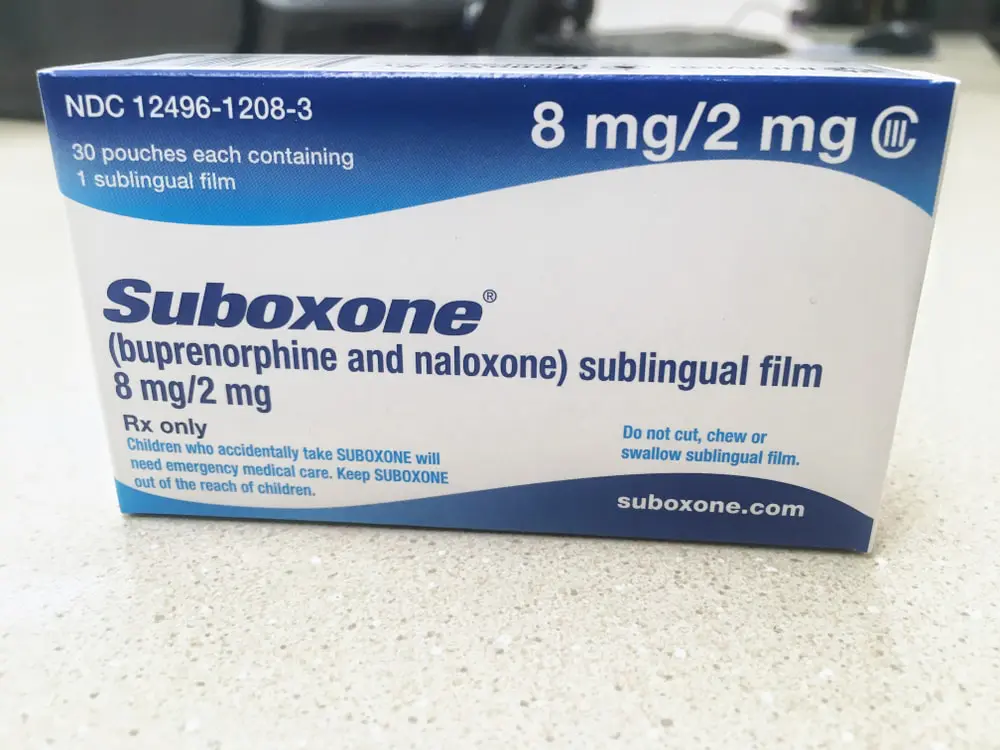How Long Does Suboxone Stay in Your System?

The prescription drug, Suboxone, combines the opioid buprenorphine with naloxone which is not an opioid. Suboxone is used in medication-assisted therapy (MAT) for opioid addicts.
Because the buprenorphine in Suboxone can cause a positive opiate test result, you may be curious about how long Suboxone stays in your system.
How Long Does Suboxone Stay in Your Blood?
Suboxone can enter your bloodstream via a tablet or film placed under your tongue or a film held between your cheek and gums.
Once absorbed into your blood it takes around 30 minutes to 3.5 hours for buprenorphine in Suboxone to get to peak blood concentration. But the body and brain effects can be felt for approximately 72 hours.
Blood testing for Suboxone is rare. That being said, it’s possible to find evidence of Suboxone in blood for at least 2 days.
How Long Does Suboxone Stay in Your Urine?
Urine tests are the most common means of checking for Suboxone. Suboxone can be found in urine for up to 6 days. This window of detection could extend depending on individual factors.
How Long Does Suboxone Stay in Your Saliva?
Suboxone’s buprenorphine component is detectable in saliva within minutes of consumption and up to an estimated 3 days.
How Long Does Suboxone Stay in Your Hair?
Testing hair samples for traces of Suboxone is not common. But, in general, substances can be found in hair from about a week after the last time taken up to 3 months after consumption.
Suboxone and Standard Drug Tests
Suboxone is usually not tested for in standard drug tests such as the 5-panel and 10-panel tests used by employers and other organizations. A special test that includes buprenorphine would have to be done to check for the substance.
How Long Does Suboxone Stay in Lab Tests?
There are some home urine drug screenings for Suboxone. These tests can cause false positives which need to be confirmed by lab tests. For the most part, testing for buprenorphine in Suboxone requires lab conditions. And, as highlighted above, the window of detection for Suboxone depends on the type of test used.
To summarize, Suboxone can typically be detected within these windows:
- Urine – up to to 6 days
- Blood – from 15 minutes to 48 hours or more
- Saliva – from 15 minutes to 72 hours or more
- Hair – about three months
Is it Possible to Detox from Suboxone Faster?
Suboxone’s active ingredient, buprenorphine, has a relatively long elimination half-life. Its half-life ranges between 24 and 42 hours. So it takes a day or two for half of the substance to leave your system. It takes a further day or two for half of what remains to leave your body. This continues until the substance is fully gone which is why Suboxone can be detected for up to six days in urine.
If you have a drug test coming up and you have a prescription for Suboxone, you simply need to inform the people conducting the test.
If you don’t want to test positive for opiates at all, you might be tempted to abruptly stop taking Suboxone. Withdrawal symptoms from doing so, while generally milder than with other opioids, can cause patients to relapse. It’s important to follow your doctor’s recommendations to slowly reduce the dosage.
A healthy lifestyle including nutritious food and exercise can speed up your metabolism and help you to detox faster.
How long a drug lasts in your body differs from person to person, based on:
- Genetics
- Age
- Weight
- Metabolism
- Hydration levels
- Kidney and liver health
- Duration of use
- Frequency of use
- The presence of other drugs in your system
Buprenorphine metabolites can accumulate in patients with kidney problems. In this scenario, the body will take longer to rid itself of Suboxone.
In addition, grapefruit juice can increase levels of Suboxone. As a result, the beverage is best avoided while you’re being treated with the drug.
The herb, St. John’s Wort, can cause the body to expel Suboxone sooner. Some medications also increase the metabolism of Suboxone. They stimulate an enzyme that can break down the medication. These medicines include:
- Phenobarbital
- Phenytoin
- Primidone
- Carbamazepine
- Rifampin
If you are trying to detox faster because of Suboxone abuse, there’s not much you can do to affect the outcome of a test. Treatment is highly recommended.
Treatment for Suboxone Addiction
When it comes to harm reduction strategies, Suboxone has a major part to play. It has helped numerous people overcome a compulsive dependence on opioids. But if misused by snorting, injecting, or consuming with other substances, Suboxone can cause a high and it can be fatal.
If you or someone you know is struggling with Suboxone abuse, it’s essential that you seek treatment. Relapse is a part of recovery. Contacting a treatment program can help you get back on the road to sobriety and relatively normal life.
Suboxone is prescribed as a temporary bridge between addiction and abstinence. But some addicts aren’t able to wean themselves off the drug. In-patient programs provide the optimal environment to cross that bridge.
Detoxes that are overseen by health professionals are safer and more comfortable. Consistent therapy can assist patients to find ways to manage cravings. Sessions can also address the various issues leading to persistent substance abuse.
Support groups are another helpful mechanism for staying on track and treatment centers can point you to those receptive to Suboxone users. Rehabs can also link patients to sober living homes and employment resources for a lifestyle overhaul.
In cases where Suboxone is taken responsibly, it’s comparable to a diabetic taking insulin. Consequently, some experts see no harm in long-term use. Maintenance doses can continue for years. With treatment, these could be happy, productive years.
- https://www.verywellmind.com/how-long-does-buprenorphine-stay-in-your-system-80228 https://www.verywellmind.com/how-long-does-buprenorphine-stay-in-your-system-80228
- https://www.medicalnewstoday.com/articles/325827.php https://www.medicalnewstoday.com/articles/325827.php
- https://www.healthline.com/health/suboxone-helped-me-overcome-addiction#7 https://www.healthline.com/health/suboxone-helped-me-overcome-addiction#7
- https://adf.org.au/drug-facts/naloxone/ https://adf.org.au/drug-facts/naloxone/
- https://www.ncbi.nlm.nih.gov/pubmed/7978599 https://www.ncbi.nlm.nih.gov/pubmed/7978599
- https://www.ncbi.nlm.nih.gov/pmc/articles/PMC5604842/ https://www.ncbi.nlm.nih.gov/pmc/articles/PMC5604842/


